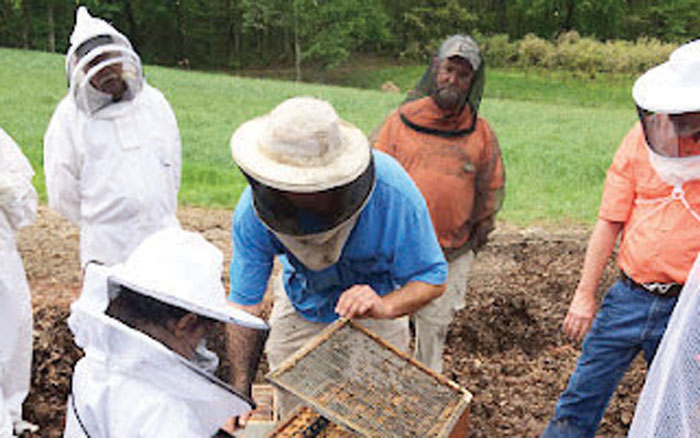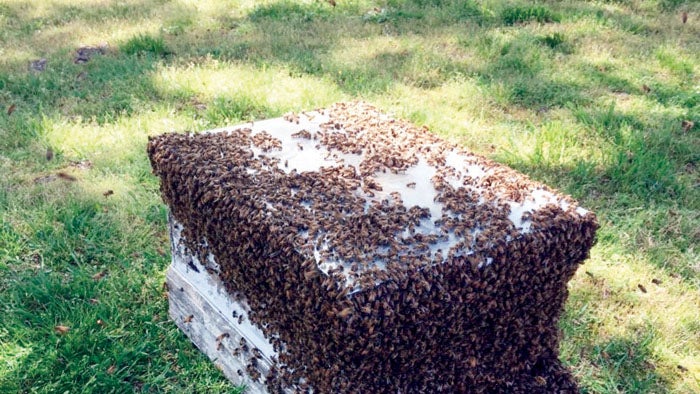Amy-Lynn Albertson: Be a beekeeper
Published 12:00 am Saturday, November 26, 2022

- Beekeepers demonstrate skills at field day
By Amy-Lynn Albertson
North Carolina Cooperative Extension
This year for Christmas, give your loved one the gift of beekeeping. The Rowan County Beekeepers Association will host the 2023 Beginning Beekeeping Course on Saturdays, Feb. 18-March 11, 8 a.m.-noon. This course costs $75 per person, including a Beekeeping for Dummies book, handouts, presentations, weekly door prize drawings, one-year membership to Rowan County Beekeepers Association and a hands-on spring apiary field day. Journeyman and Master Beekeepers will teach the class. To register for the course, go to go.ncsu.edu/rowanbeekeepers2023. Learn the basics of being a beekeeper and managing your bees.
Honeybees account for an estimated $70 million of North Carolina’s agriculture industry between pollination and honey. North Carolina beekeepers also produce a wide variety of bee products from the beehive with their honeybees’ aid. The products have various uses, such as beeswax for candles, royal jelly for cosmetics, bee pollen as a protein source and more. These products, though popular, are not the primary importance of honeybees in the state. Honeybees are the most important pollinators of food crops for humans and probably food for wildlife in North Carolina and the entire nation. You might ask, “Don’t other insects pollinate as well?” The answer is yes, but none with the unique features that honeybees possess. A honeybee colony may consist of up to 60,000 individuals, while most other insects are solitary or only have colonies of a few hundred individuals. Beekeepers can move honeybee colonies to any location where bees are needed for pollination, which is not usually an option with other insects.
Honeybees also pollinate many fruits, vegetables and seeds in the home garden. Honeybees use nectar to make honey. Nectar is almost 80% water with some complex sugars. They use their long, tubelike tongues like straws to suck the nectar out of the flowers and store it in their “honey stomachs.” Bees have two stomachs, their honey stomach, which they use like a nectar backpack, and their regular stomach. The honey stomach holds almost 70 mg of nectar; when full, it weighs almost as much as the bee. Honeybees must visit between 100 and 1,500 flowers to fill their honey stomachs.
The honeybees return to the hive and pass the nectar onto other worker bees. These bees suck the nectar from the honeybee’s stomach through their mouths. These “house bees” “chew” the nectar for about half an hour. During this time, enzymes break complex sugars in the nectar into simple sugars so that they are both more digestible for the bees and less likely to be attacked by bacteria while stored within the hive. The bees then spread the nectar throughout the honeycombs, where water evaporates, making it a thicker syrup. The bees dry the nectar even faster by fanning it with their wings. Once the honey is gooey enough, the bees seal off the honeycomb cell with a wax plug. The honey is stored until it is eaten. In one year, a colony of bees eats between 120 and 200 pounds of honey. Bees use the stored honey for food during the winter months. The honey you see at the farmers’ market and grocery store is usually harvested in the summer when there are many blooming plants with nectar.
Bees are wonderful, fascinating, essential creatures vital to our health and the health of our planet. They are primary pollinators for flowers, gardens and crops and are responsible for pollinating at least 1/3 of the foods we eat. Beekeeping is a very fulfilling hobby and can be financially beneficial when your hives produce extra honey and beeswax to sell or gift to others. Beekeeping can be a lifelong learning experience. Bees have a complex society that is endlessly fascinating to observe and learn about. Beekeeping is also a social experience where experienced beekeepers can mentor and talk to you, attend association meetings and conferences, and talk to family and friends about your bees.
For more information about honeybees or the Rowan County Beginning Beekeeper School, please contact Rowan County Cooperative Extension at 704-216-8970 or http://rowan.ces.ncsu.edu.
Amy-Lynn Albertson is the director of the Rowan County Extension.





